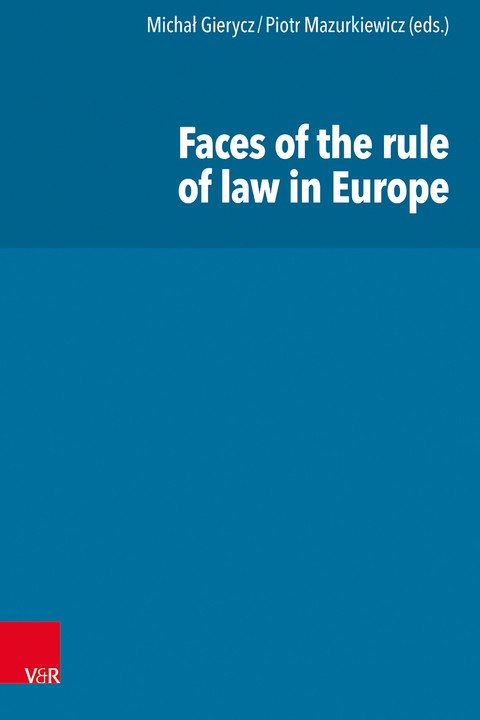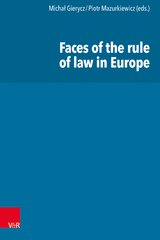Faces of the rule of law in Europe
Seiten
2024
|
1. Aufl. 2024
Vandenhoeck & Ruprecht (Verlag)
978-3-525-30258-3 (ISBN)
Vandenhoeck & Ruprecht (Verlag)
978-3-525-30258-3 (ISBN)
The book undertakes historical, philosophical, and theological reflections on the idea of the rule of law.
The current discussion on the rule of law, especially in the EU, seems to be developing because the terms that express the idea of the rule of law in different European languages do not convey the same content. The rule of law, der Rechtstatt, l'état de droit, to name just three language versions, were coined in different historical contexts and within different traditions of political thought. The question then becomes, to what extent is diversity in the understanding of the rule of law still legitimate today? The answer is sought in the book we have edited, whose authors are academically recognized individuals representing these different traditions of legal and political thinking.The publication is divided into three parts. The first part explains the concept of the rule of law and outlines the development of the idea of the rule of law. The analyses presented also address the issue of legal positivism seen as a minimization of the idea of the rule of law. In addition, this part includes articles on the problem of the rule of law from the perspective of Catholic social thought, as well as a consideration of the transformation of the legal concept of the rule of law into a kind of political fetish. Part two is devoted to various European traditions of understanding the rule of law. In this part of the book, the reader will find articles on approaches to the issue of the rule of law from the Anglo-Saxon, French, German, and Polish perspectives. The third part of the book deals with the issue of the rule of law from the perspective of the European Union. It is about the mechanisms of control of the rule of law in the Member States and the possibility of applying this concept to the EU.
The current discussion on the rule of law, especially in the EU, seems to be developing because the terms that express the idea of the rule of law in different European languages do not convey the same content. The rule of law, der Rechtstatt, l'état de droit, to name just three language versions, were coined in different historical contexts and within different traditions of political thought. The question then becomes, to what extent is diversity in the understanding of the rule of law still legitimate today? The answer is sought in the book we have edited, whose authors are academically recognized individuals representing these different traditions of legal and political thinking.The publication is divided into three parts. The first part explains the concept of the rule of law and outlines the development of the idea of the rule of law. The analyses presented also address the issue of legal positivism seen as a minimization of the idea of the rule of law. In addition, this part includes articles on the problem of the rule of law from the perspective of Catholic social thought, as well as a consideration of the transformation of the legal concept of the rule of law into a kind of political fetish. Part two is devoted to various European traditions of understanding the rule of law. In this part of the book, the reader will find articles on approaches to the issue of the rule of law from the Anglo-Saxon, French, German, and Polish perspectives. The third part of the book deals with the issue of the rule of law from the perspective of the European Union. It is about the mechanisms of control of the rule of law in the Member States and the possibility of applying this concept to the EU.
Michał Gierycz is an Associate Professor of Political Science and dean of the Faculty of Social and Economic Science at Cardinal Stefan Wyszynski University in Warsaw (Poland).
Piotr Mazurkiewicz is a Full Professor of Political Science at Cardinal Stefan Wyszynski University in Warsaw (Poland).
| Erscheinungsdatum | 29.07.2024 |
|---|---|
| Co-Autor | Zbigniew Stawrowski, Sara Lagi, András Zsolt Varga, Michel De Villiers, Paweł Kaczorowski, Bogdan Szlachta, Iain T. Benson, Jane Adolphe, Dorin-Mircea Dobra, José Luis Bazán, Tomasz Grzegorz Grosse |
| Verlagsort | Göttingen |
| Sprache | englisch |
| Maße | 160 x 235 mm |
| Gewicht | 623 g |
| Themenwelt | Geschichte ► Teilgebiete der Geschichte ► Militärgeschichte |
| Recht / Steuern ► Rechtsgeschichte | |
| Sozialwissenschaften ► Politik / Verwaltung ► Politische Theorie | |
| Schlagworte | Europäische Union • Naturrecht • Rechtsstaatlichkeit • Rechtstaat |
| ISBN-10 | 3-525-30258-4 / 3525302584 |
| ISBN-13 | 978-3-525-30258-3 / 9783525302583 |
| Zustand | Neuware |
| Haben Sie eine Frage zum Produkt? |
Mehr entdecken
aus dem Bereich
aus dem Bereich
neueste Manipulationstechniken als Waffengattung der NATO
Buch | Softcover (2023)
Westend (Verlag)
CHF 33,55




